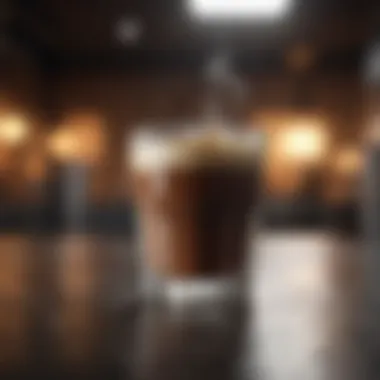The Effects of Caffeine on Erectile Dysfunction


Intro
The connection between what we drink daily and our sexual health is often brushed aside in the hustle and bustle of modern life. Caffeine, for instance, is not just a morning staple but also a focal point of interest for health professionals. Some conversations have circled around whether caffeine affects erectile dysfunction, leading to a landscape fraught with misconceptions. It can be hard to navigate through the murky waters of health claims and research findings. The aim of this analysis is to shed some light on this complex relationship, presenting information that could alter how one perceives the morning ritual.
Understanding the biological impacts of caffeine lays groundwork for discerning whether it serves as a potential ally or foe in sexual health matters. While many people enjoy coffee or tea as a pick-me-up, not everyone considers how these beverages could influence intimate relationships. Thus, this article seeks to clarify myths, highlight studies, and provide insights into how those cups of coffee might be connected to erectile function—specifically, how various populations may experience these effects differently.
Peel Back the Layers
Before diving into the finer points of caffeine's effects, it’s essential to understand its widespread consumption and its physiological implications. With caffeine being a stimulant that impacts the brain and body, it is somewhat paradoxical to consider how it fits into discussions about erectile dysfunction. Perhaps we ought to glance at this from varying angles to capture a well-rounded perspective.
We'll explore multiple aspects: the potential health benefits that caffeine might offer, alongside practical dietary and lifestyle recommendations. As we develop this narrative, we will aim to equip a range of readers—from health practitioners to wellness coaches—with a nuanced toolkit of insights.
Foreword to Erectile Dysfunction
Understanding erectile dysfunction (ED) is crucial for both patients and health professionals as it serves as a window into broader health issues. The topic isn't merely about the physical act of sex; it intertwines with emotional well-being, relationship dynamics, and, often, self-esteem. When exploring the intricacies of sexual health, it becomes evident that ED can stem from a combination of psychological and physiological factors. This introduction sets the stage for a deeper investigation into these complexities, highlighting the importance of recognizing ED as not just a physical ailment but as a condition that can reflect a man’s overall health.
Defining Erectile Dysfunction
Erectile dysfunction is typically characterized by the persistent inability to achieve or maintain an erection sufficient for satisfactory sexual performance. In simpler terms, it's a struggle some men face in the bedroom. While the occasional episode might not raise alarms, consistent challenges could indicate underlying health issues, whether they be vascular, neurological, or hormonal.
ED can be classified into two categories: primary and secondary. Primary ED is when a man has never been able to get or keep an erection. On the other hand, secondary ED refers to those who have experienced erectile function in the past but find themselves struggling due to various reasons.
A precise definition is critical when discussing treatments and implications, as the approach to address ED varies based on its underlying causes. It's significant to engage in open dialogue and assessment with clients to assist them effectively.
Prevalence and Risk Factors
The prevalence of erectile dysfunction can be likened to a silent epidemic. Statistics reveal that approximately 30 million men in the United States alone are affected by this condition, and that number seems to rise with age. Research indicates that the likelihood of developing ED increases with various risk factors, including:
- Age: Older men are at higher risk, often due to natural bodily changes.
- Chronic Illnesses: Conditions like diabetes, hypertension, and cardiovascular diseases can lead to ED.
- Lifestyle Factors: Obesity, smoking, excessive alcohol consumption, and physical inactivity significantly increase the risk.
- Psychological Components: Anxiety, depression, and relational issues can act as contributors.
Recognizing these factors enables healthcare professionals to provide targeted strategies and recommendations to mitigate risks.
Psychological and Physical Impacts
Erectile dysfunction doesn't just affect the physical realm; it can have far-reaching psychological implications. The inability to maintain an erection can lead to feelings of embarrassment or inadequacy. Over time, this emotional burden can strain relationships and hinder communication with partners.
From a physical viewpoint, the implications of ED are profound. Research presents compelling evidence that ED might be an early indicator of cardiovascular health, with one study noting that men with ED are more likely to have undiagnosed heart disease. This correlation underscores the necessity of comprehensive health assessments.
Moreover, the physical implications can be compounded by mental health issues. For instance, a vicious circle can develop where anxiety regarding performance exacerbates the condition itself. Thus, understanding the multi-faceted impact of erectile dysfunction is essential in addressing both the symptoms and the root causes of the condition, guiding men towards healthier living and fostering greater openness in discussing sexual health.
Understanding Caffeine
Caffeine is often considered a double-edged sword in health discussions. On one hand, it is lauded for its acclaimed ability to enhance alertness and boost cognitive performance. On the other hand, there are legitimate concerns regarding its impact on certain aspects of health, notably sexual function. This section aims to bring a clearer perspective on caffeine—what it is, where it comes from, and how it integrates into our daily lives. By understanding caffeine better, we can draw connections to its effects, including those that may influence erectile dysfunction.
What is Caffeine?
Caffeine is primarily known as a central nervous system stimulant. It operates by blocking the action of adenosine, a neurotransmitter that promotes sleep and relaxation. As a result, the individual feels more energetic and alert. This mechanism explains why many people reach for a cup of coffee first thing in the morning or during the mid-afternoon slump.
The biological half-life of caffeine, which is how long it stays active in the body, varies significantly among individuals. Factors such as age, genetics, and even lifestyle choices like smoking can affect how quickly caffeine is metabolized. This variability plays a critical role in its impact on health.


Sources of Caffeine
Caffeine is not confined to coffee alone; it can be found in a myriad of products, which has implications for how much of it we consume unknowingly. Common sources include:
- Coffee: A standard cup of brewed coffee can contain anywhere from 95 to over 200 milligrams of caffeine.
- Tea: Black and green teas also provide moderate amounts, generally between 20 to 60 milligrams per cup.
- Soft Drinks: Many carbonated soft drinks often include caffeine, primarily to enhance flavor.
- Energy Drinks: These can contain substantial amounts of caffeine, sometimes exceeding 300 milligrams in a single serving.
- Chocolate: Particularly dark chocolate, is another source, due to the natural cacao content.
Consumption Patterns
Understanding how people consume caffeine is crucial for assessing its effects on erectile dysfunction. Global consumption patterns reveal some intriguing trends. Studies show that while coffee remains the most popular source of caffeine, consumption varies widely between cultures.
Here are a few notable patterns:
- Occupational Influence: Professionals in high-stress jobs often report increased caffeine consumption to stay alert.
- Age Differences: Younger adults are more inclined to consume energy drinks, while older generations might prefer coffee or tea.
- Gender Disparities: Research has suggested that men are generally more likely to consume caffeine in greater amounts compared to women. It's a subtle but important aspect when discussing health impacts.
In summary, the role that caffeine plays in daily habits can have far-reaching consequences on health, both positively and negatively. Recognizing what caffeine is, its sources, and how it is consumed provides a strong foundation for understanding its complex relationship with erectile dysfunction.
Mechanisms of Action of Caffeine
Understanding the mechanisms by which caffeine operates in the body is essential for unraveling its potential impacts on erectile dysfunction. Caffeine isn’t just a pick-me-up that helps many shake off morning grogginess; it possesses a range of physiological effects that can influence sexual health. By diving into how caffeine interacts with key body systems, we can shed light on both its benefits and considerations in the context of erectile function. This section explores its interplay with the central nervous system, blood circulation, and hormonal balance, providing a clearer picture of how something as commonplace as coffee can wield significant influence over sexual health.
Caffeine and the Central Nervous System
When we talk about caffeine, we cannot neglect its profound effects on the central nervous system. It works primarily by blocking adenosine receptors, which play a crucial role in promoting sleep and suppressing arousal. By inhibiting adenosine, caffeine boosts the release of neurotransmitters like dopamine and norepinephrine. These hormones are known for enhancing mood and increasing alertness.
But how does this relate to erectile dysfunction? Improved mood and increased energy levels can lead to elevated confidence, which is inherently tied to sexual performance. Several studies suggest that a heightened state of arousal due to caffeine consumption might improve the overall sexual experience, setting the stage for better erectile function.
That said, the relationship isn't solely positive. Excessive consumption might lead to anxiety and jitteriness, which can, unfortunately, dampen sexual arousal. Thus, it creates a kind of dance where moderation becomes key.
Effects on Blood Flow and Circulation
Caffeine's impact on blood flow is another significant piece of the puzzle. It acts as a vasodilator, meaning it opens up blood vessels and improves circulation. Enhanced blood flow is vital for achieving and maintaining an erection, as it's blood engorgement in the penis that allows for erection to occur.
"Caffeine's role in stimulating blood flow could potentially enhance erectile functionality in some individuals."
Research suggests that moderate caffeine consumption may correlate with improved erectile function, especially in men suffering from occasional issues. However, the way caffeine achieves this effect can be variable, depending on individual health factors, such as pre-existing conditions like hypertension or cardiovascular disease. These factors may inherently affect how caffeine either aids or hinders blood flow in men.
Influence on Hormonal Levels
Caffeine doesn’t just spur on neurotransmitters and blood circulation; it also has a hand in hormonal modulation. The consumption of caffeine can stimulate the adrenal glands, leading to an increase in catecholamines—particularly adrenaline. This hormonal shift can enhance physical performance and feeling of energy.
Another aspect to consider is testosterone, the primary male sex hormone. Some studies indicate that moderate doses of caffeine may increase testosterone levels, albeit modestly. Higher testosterone levels could correlate with improved libido and fertility, which directly relates to sexual health and potency.
However, it’s important to note that like many things, the effects can differ from person to person. What's beneficial for one individual may not have the same impact on another due to variations in hormonal balance, lifestyle factors, and overall health.
In summary, the mechanisms through which caffeine influences erectile function offer a complex interplay of positive and negative aspects. The central nervous system’s response, effects on circulation, and hormonal influences both create avenues for potential improvement in sexual health and showcase the need for a balanced approach.
Caffeine and Sexual Health
Exploring the intersection of caffeine and sexual health reveals intriguing dimensions worth noting. Caffeine, a widely consumed stimulant, does not just provoke a morning pick-me-up; it dives deeper into the intricate dynamics of human physiology, particularly in relation to erectile function. Understanding how caffeine interacts with various biological systems might shed light on both potential benefits and pitfalls regarding sexual health. This conversation is particularly relevant as the relationship between lifestyle choices and erectile dysfunction becomes more pronounced in modern discourse.
Potential Positive Effects of Caffeine


Research suggests that when consumed in moderation, caffeine might lend some beneficial effects to sexual health. Some studies have indicated that regular intake can possibly enhance vascular function. This is significant, considering erectile dysfunction is often linked to poor blood flow. Caffeine's ability to dilate blood vessels improves circulation, which could, hypothetically, support erectile performance. Moreover, some anecdotal evidence points to that buzzed feeling one gets after a good cup of coffee sharpening arousal. Whether it's due to increased heart rate or heightened energy levels, there seems to be a fine line between stimulation and overindulgence.
"Moderate caffeine consumption might be the tilt that some men need to experience improved erectile function."
Additionally, caffeine might play a role in lowering the risk of certain conditions that influence sexual health. By reducing risks associated with type 2 diabetes and metabolic syndrome, caffeine may help in maintaining a healthier overall sexual function.
Negative Consequences of Excessive Consumption
On the flip side, too much of a good thing can turn sour, and excessive caffeine intake is no exception. Over-indulgence can lead to heightened anxiety and jitteriness. When one’s stress levels spike, blood vessels constrict, directly opposing the benefits derived from moderate consumption. High caffeine levels can also elevate cortisol production, which may have a negative impact on hormone levels crucial for erectile function. Moreover, some individual reactions to caffeine can lead to sleep disturbances, which in turn negatively affects testosterone levels, potentially contributing to erectile dysfunction.
Symptoms of Overconsumption:
- Jitters or restlessness
- Increased heart rate
- Heightened anxiety
- Sleep disturbances
These symptoms can certainly detract from one’s quality of life, showcasing the importance of moderation. Awareness is key here; understanding where to draw the line can make a world of difference in one’s experience.
Individual Variability in Response
It's important to remember that the impact of caffeine is not one-size-fits-all. Individual responses to caffeine can vary significantly based on numerous factors, including genetics, tolerance, and existing health conditions. What energizes one person could lead another towards discomfort or anxiety. This variability can create confusion, particularly for those trying to gauge how caffeine might influence their sexual well-being.
Additionally, other lifestyle habits—like diet and exercise—can interact with caffeine’s effects. One person might find that their morning ritual of a strong espresso enhances their mood and, in turn, their sexual desire. In contrast, another might experience heightened anxiety and subsequent erectile challenges.
Key Research Studies on Caffeine and Erectile Dysfunction
Research on caffeine's effects on erectile dysfunction is multifaceted and revealing. Understanding the connection between these two subjects allows health professionals and wellness experts alike to tailor their recommendations for individuals seeking solutions to erectile issues. A robust body of research can shed light on biological pathways, consumption patterns, and even patient experiences, all important factors in approaching the subject from a health perspective. Gathering insights from rigorous studies adds to the overall narrative of sexual health and how lifestyle choices—like caffeine intake—play a role.
Summary of Major Studies
Several studies have focused on how caffeine consumption interacts with erectile functionality, producing various results. One large-scale study, published in The American Journal of Clinical Nutrition, analyzed dietary habits and sexual health in men aged 20 to 85. It found a potential correlation between moderate caffeine intake and reduced risk of erectile dysfunction. The researchers posited that caffeine-induced vasodilation due to increased nitric oxide levels might play a role in enhancing blood flow to erectile tissues.
Another research undertaken by the Harvard Health Professionals Follow-Up Study with over 18,000 participants indicated that men who consumed two to three cups of coffee daily reported lower rates of erectile dysfunction. The findings suggested that habitual caffeine consumption may contribute positively to erectile performance, although it underlines a critical aspect—moderation is key.
In contrast, a more limited study focusing on individuals with existing cardiovascular conditions flagged caution against excessive caffeine intake due to potential exacerbations of blood pressure, which could counteract the positive findings on erectile health. Therefore, while there are promising indications, caution is warranted.
Contradictory Findings
Not all research aligns neatly, and contradictions can yield important insights. For instance, a study in BJU International found no correlation between caffeine intake and erectile function in their assessed demographic, advising that the relationship is not sufficiently robust to make sweeping recommendations. Additionally, some studies suggest a threshold effect, where too much caffeine may trigger anxiety or jitteriness, potentially hindering sexual performance.
The nuances present in this body of research highlight that while moderate caffeine consumption could be linked to beneficial outcomes, variability in individual health conditions must be factored in. Some men may find that caffeine has opposite effects, such as increased anxiety or disturbing sleep patterns, which can both severely impact erectile capabilities over time.
“While moderate caffeine could serve as a potential ally in the fight against erectile dysfunction, caution should be exercised. The effects often vary from one individual to another.”
The disparity in findings illustrates the importance of personalized dietary approaches. Men experiencing erectile dysfunction should consider reviewing their caffeine consumption patterns with healthcare professionals to determine individual suitability and potential adjustments that take personal health factors into account.
Expert Opinions on Caffeine Consumption
When delving into the intricacies of caffeine's potential impact on erectile dysfunction, expert perspectives hold significant weight. Both urologists and nutritionists bring their specialized knowledge to the table, providing insights that can help clarify the multifaceted relationship between caffeine intake and sexual health. Understanding these expert opinions not only enriches the narrative but also adds layers to our comprehension, enabling individuals to make informed choices regarding their caffeine consumption and sexual well-being.
Urologists' Perspectives


Urologists have a front-row seat in observing how various factors—including lifestyle habits like caffeine consumption—affect male patients' sexual health. From a clinical standpoint, many urologists recognize that moderate caffeine intake may not pose a risk to erectile function; in fact, some studies suggest potential benefits. For instance, caffeine's stimulant properties could enhance blood circulation, potentially improving erectile function in certain individuals.
However, it’s essential to note that excessive caffeine may lead to heightened anxiety or increased heart rate, which could indirectly impact sexual performance—something men should keep in mind. According to expert Dr. Michael S. Karpman, a urologist known for his research in this area, "Moderation is key; too much can overwhelm the body and contribute to anxiety, which isn't helpful during intimate moments." This perspective underscores the importance of balance, urging men to consider their unique responses to caffeine rather than adopting a one-size-fits-all approach.
Additionally, many urologists advocate for a holistic examination of a patient's lifestyle when addressing erectile dysfunction. Stress, diet, and overall health play critical roles, and caffeine is just one piece of the puzzle. By encouraging patients to pay attention to their consumption levels and other lifestyle factors, urologists equip them with actionable strategies for improvement.
Nutritionists' Insights
On the other hand, nutritionists provide a different angle, focusing on how dietary patterns influence both general health and sexual function. From their perspective, caffeine is closely linked to dietary habits, making understanding its role all the more pertinent. Nutritionists often emphasize that moderation is essential. According to registered dietitian Sarah Oppenheimer, "Caffeine can have positive effects, like increased alertness and energy, but too much can lead to unintended consequences such as jitteriness and insomnia, which can ultimately affect one’s sexual desire and performance."
Nutritionists also highlight individual variability in caffeine response—what works for one person may not work for another. For instance, someone with a high tolerance may find no adverse effects from their daily coffee, while another might feel anxious and restless after just a single cup. This knowledge underscores the necessity of personalized dietary adjustments, as nutritionists work with clients to identify the amount and sources of caffeine that best suit their bodies.
"Every body reacts differently. Finding your balance with caffeine can lead to optimal health outcomes, including sexual health," says nutritionist Dr. Rachel L. Thompson.
In summary, expert opinions from urologists and nutritionists shed light on how caffeine intersects with erectile dysfunction. Urologists advocate for understanding the physiological impacts, while nutritionists remind us that dietary patterns play a pivotal role in overall well-being. As these professionals guide individuals through the complexities surrounding caffeine consumption, it becomes clear that a personalized and moderate approach may yield the best results for sexual health.
Practical Implications for Men
Understanding the connection between caffeine consumption and erectile dysfunction is particularly important for men navigating their sexual health. The choices regarding caffeine intake can have a significant impact not only on erectile function but also on overall well-being. Therefore, making informed decisions based on current research can shape health outcomes for individuals. This section delves into the implications of caffeine habits and provides actionable insights for men seeking to improve their sexual health.
Moderation and Awareness
Men should approach caffeine consumption with a balanced mindset. While moderate caffeine intake can confer several advantages, too much of it can lead to an array of negative effects, including increased anxiety, sleep disturbances, and even heightened blood pressure. It is essential to be aware of how these side effects might indirectly influence sexual performance.
- Awareness of Limits: Being conscious of one’s caffeine tolerance is crucial. Men experiencing symptoms like rapid heartbeat, nervousness, or difficulty sleeping may need to reassess their caffeine intake.
- Recommended Intake: Observational studies suggest that men can safely consume up to 400 mg of caffeine daily, roughly the amount found in four 8-ounce cups of brewed coffee. However, individual responses may vary, necessitating a personalized approach to consumption.
- Monitoring Symptoms: Keeping a journal to track how caffeine affects physical feelings and sexual performance could also be beneficial. If erectile dysfunction symptoms happen to occur with increased caffeine intake, it might be wise to scale back.
"Understanding your body is a journey, not just a destination. Listening to how caffeine affects you is key."
Caffeine Alternatives
For those who find themselves overly reliant on caffeine, exploring alternatives could prove fruitful. There are numerous substitutes that can provide a boost of energy without the potential drawbacks associated with caffeine. These alternatives also cater to varying preferences, helping men retain vigor without jeopardizing erectile health.
- Herbal Teas: Varieties like ginseng or peppermint can enhance energy levels naturally. Ginseng, in particular, has been linked to improved sexual function, making it a fair substitute.
- Matcha Green Tea: This offers a different elegance, packing a smaller caffeine punch than coffee while being rich in antioxidants, which may benefit cardiovascular health—a crucial factor in erectile function.
- Chicory Coffee: This caffeine-free earthy drink mimics the taste of coffee and is a great option for those wanting to cut back on caffeine.
- Coconut Water: Not only hydrating, but it can offer a refreshing energy boost thanks to its natural electrolytes.
Ultimately, the aim is to empower men in their health choices by fostering understanding about caffeine’s role in their lives. This enables them to make informed decisions, potentially enhancing both erectile function and overall health.
End and Future Research Directions
The intricate relationship between caffeine and erectile dysfunction presents a multifaceted area of inquiry that deserves attention and careful consideration. As this article has explored, caffeine consumption may yield a variety of physiological effects, some of which carry implications for sexual health. Understanding how caffeine interacts with various bodily systems is critical for health professionals, nutritionists, and anyone involved in wellness coaching.
Current Gaps in Knowledge
Despite the existing studies and discussions surrounding caffeine and erectile dysfunction, several gaps remain in our understanding. Notably, the long-term effects of caffeine consumption on erectile health is markedly underexplored.
- Mixed study results: Some studies suggest a positive correlation between moderate caffeine intake and erectile function, whereas others find no discernible link or even negative effects.
- Lack of diverse populations in research: Many studies tend to focus on homogeneous demographic groups. This raises questions about how different ages, ethnic backgrounds, and pre-existing health conditions influence the effects of caffeine.
- Absence of longitudinal data: Most current research methods provide a snapshot understanding rather than a continuous view over time. Longitudinal studies examining caffeine's effects on erectile health would add valuable insight.
These points highlight the need for more comprehensive and varied research regarding how caffeine plays a role in sexual health as well as its broader implications across different populations.
Call for Further Studies
In light of the above gaps, further investigation in this field is not just beneficial; it is essential. Future studies could focus on several key areas:
- Detailed Mechanisms of Action: Delving deeper into how caffeine influences hormonal levels and vascular health specifically regarding erectile function.
- Behavioral Correlates: Exploring the relationship between lifestyle factors—such as diet, exercise, and mental health—and how they might mediate or moderate caffeine's effects on erectile dysfunction.
- Longitudinal Analysis: Implement studies that track caffeine consumption and erectile health over months or years to ascertain long-term impacts.
- Cross-cultural Studies: Addressing how cultural differences in caffeine consumption habits affect sexual health across different populations.
Through rigorous research efforts, it is possible to shed light on this complex interaction. Besides persuading clinicians and wellness professionals to reconsider general recommendations about caffeine, this also could lead to tailored approaches that promote better sexual health.
A nuanced understanding of caffeine’s role in erectile function could empower individuals to make informed dietary choices while also helping practitioners provide better guidance. As we move forward, collaborative efforts from researchers, health experts, and practitioners alike will shape the narrative surrounding the delicate interplay of caffeine and sexual health.















